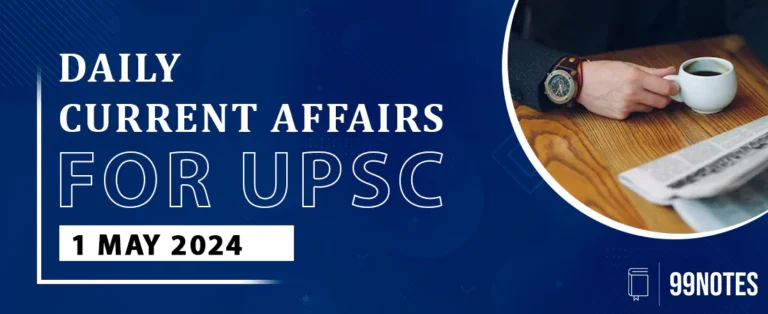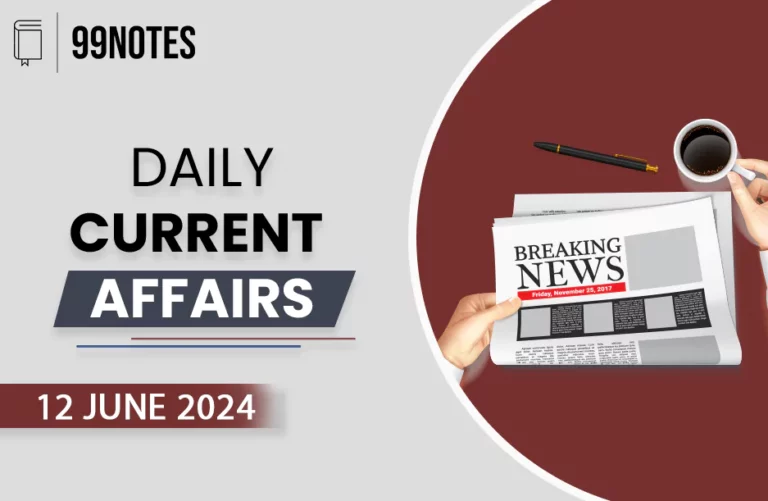21 November 2023 : Daily Current Affairs
Daily Current Affairs
21-November-2023
1. Governor can’t withhold re-passed Bills, says SC.
Topic: GS2 – Indian polity.
Context:
- The Supreme Court considered the Tamil Nadu government’s argument on the Governor’s discretion to withhold 10 Bills re-passed by the State Legislative Assembly.
- Chief Justice of India D.Y. Chandrachud stated that once Bills are re-passed, they are on par with Money Bills, and rejection by the Governor is not permissible.
- The State referred to Article 200’s first provison, emphasizing that if the Bill is re-passed and presented to the Governor, assent cannot be withheld.
- The Chief Justice questioned whether the Governor must send Bills back to the House after withholding assent, to which the State argued that it is a necessary corollary.
- Acknowledging the State’s submission, the court noted that the Governor, after withholding assent and sending back the Bills, cannot refer them to the President.
- The State expressed concern that the Governor’s indefinite withholding of Bills is depriving the people of Tamil Nadu of the benefits of crucial laws passed by the House.
Question: Examine the constitutional provisions related to the Governor’s discretion in withholding assent to bills. Evaluate the impact on the legislative process and the rights of the state government.
2. ‘China is the biggest security anxiety for India and Australia’
Topic: GS2 – International relations
Context:
- Australian Deputy Prime Minister and Defence Minister Richard Marles expressed that China is the “biggest security anxiety” for both India and Australia during the 2+2 dialogue.
- Indian Defence Minister Rajnath Singh emphasized consensus on the importance of a strong India-Australia partnership for the overall peace, security, and prosperity of the Indo-Pacific.
Why China is the biggest security anxiety for India?
- Territorial Disputes: India and China have longstanding border disputes, leading to military standoffs and tensions.
- Strategic Rivalry: China’s rising influence in the region poses a strategic challenge to India’s security interests.
- Economic Competition: Economic and trade competition adds another dimension to the security concerns.
- Military Buildup: China’s military modernization and infrastructure development along the border raise security apprehensions.
- Regional Influence: China’s assertiveness in the Indo-Pacific region impacts India’s geopolitical standing and security dynamics.
3. SC seeks Kerala Governor’s reply on petition against pending Bills
Topic: GS2 – Indian polity.
Context:
- The Supreme Court has sought a response from Kerala Governor Arif Mohammed Khan in response to a petition by the State government.
- The petition alleges that the Governor is indefinitely withholding key Bills presented for assent, causing delays ranging from seven to 23 months.
Potential implications of governor holding assent with bills:
- Delay in implementation of laws:If a governor holds assent with a bill, it can delay the implementation of the law. This can have a number of negative consequences, such as uncertainty for businesses and individuals, and a lack of clarity about the legal framework.
- Increased political tension:A governor holding assent with a bill can also increase political tension between the governor and the legislature. This can make it more difficult for the two branches of government to work together effectively.
- Legal challenges:If a governor holds assent with a bill, it can also lead to legal challenges. This is because the governor may be seen as acting outside of their authority in refusing to sign a bill into law.
- Loss of public trust: If a governor holds assent with a bill that is popular with the public, it can lead to a loss of public trust in the governor. This can make it more difficult for the governor to govern effectively in the future.
- Political posturing:In some cases, a governor may hold assent with a bill as a form of political posturing. This is especially likely if the governor is from a different party than the legislature.
- Constitutional crisis: In extreme cases, a governor holding assent with a bill can lead to a constitutional crisis. This is because it can raise questions about the separation of powers and the role of the governor in the legislative process.
Way forward:
- Establish clear guidelines for gubernatorial assent: Clearly define the circumstances under which a governor can hold assent with a bill and establish a time frame for the governor to make a decision. This would provide greater transparency and predictability in the legislative process.
- Enhance communication and collaboration between the governor and legislature: Encourage regular dialogue and open communication between the governor’s office and the legislature to foster mutual understanding and address concerns early on. This could help prevent disagreements from escalating to the point of withholding assent.
- Strengthen judicial review mechanisms: Provide clear and accessible mechanisms for judicial review of gubernatorial decisions to ensure that they are within the bounds of the constitution and do not unreasonably obstruct legislative action.
- Empower legislative oversight: Establish robust legislative oversight mechanisms to hold the governor accountable for their actions, including the power to override a gubernatorial veto with a two-thirds majority vote.
- Foster public engagement and dialogue: Encourage public participation in the legislative process and promote open discussions about the implications of gubernatorial assent on the implementation of laws and the overall functioning of the government.
- Consider constitutional amendments: If the issue of gubernatorial assent proves to be a recurring challenge, consider exploring constitutional amendments to clarify the governor’s role in the legislative process and address any perceived imbalances in power.
Question: Critically examine the implications of a governor holding assent with bills and suggest measures to address the potential challenges arising from this practice.
4. How free cancer care alone won’t help the fight against cancer in India
Topic: GS3 – Health sector.
Financial Fallout of Cancer in India:
High Costs Despite Government Support:
- Despite initiatives like PMJAY providing health insurance, cancer patients in India face catastrophic health expenses, affecting over 80% even with state-sponsored coverage.
Private Sector Burden:
- Free cancer care is available in government facilities, but patients resort to private healthcare due to overburdened public systems, leading to substantial out-of-pocket expenses.
Direct and Indirect Costs:
- Costs encompass direct medical (consultation, medicines, tests), direct non-medical (transport, accommodation), and indirect (loss of productive hours/income).
Treatment Delays and Worsening Conditions:
- Overburdened government hospitals result in treatment delays, forcing patients to opt for private facilities, worsening financial burdens as diseases progress.
Impact on Breadwinners:
- Cancer’s financial impact is severe when it affects family breadwinners, leading to job loss or cessation of work, amplifying economic distress.
Rural Challenges:
- Rural patients face additional challenges like travel expenses, accommodation costs in cities, and borrowing money, exacerbating financial strain.
Government Efforts and Challenges:
- Some states offer concessions and schemes, but awareness gaps, inadequate coverage, and regional variations limit their effectiveness.
Need for Accessible Cancer Care:
- Establishing publicly funded cancer care centers across India is essential to address post-cancer financial challenges effectively and prevent impoverishment.
Continuous Financial Support:
- Until cancer care becomes widely accessible, ongoing financial support is crucial to alleviate the suffering of patients and their families.
5. India-Australia ties to benefit security of the Indo-Pacific.
Topic: GS2 – International relations
Context:
- Defence Minister Rajnath Singh and Australian Deputy Prime Minister Richard Marles engaged in bilateral talks, focusing on key areas of cooperation.
Additional details on the news:
Ongoing Discussions:
- The discussions included advanced stages of implementing arrangements for hydrography cooperation and air-to-air refuelling.
Niche Training Areas:
- Both sides expressed interest in collaborating on niche training areas such as artificial intelligence, anti-submarine warfare, anti-drone warfare, and the cyber domain.
Defence Industry Collaboration:
- There was a mutual agreement on the significance of deepening cooperation in the defence industry and research, with the aim of enhancing the existing strong relationship.
Areas of Collaboration:
- Suggestions were made for collaboration in specific areas, including shipbuilding, ship repair, maintenance, and aircraft maintenance, repair, and overhaul.
Overall Security in Indo-Pacific:
- Both ministers acknowledged that a robust India-Australia defence partnership not only benefits both nations but also contributes to the overall security of the Indo-Pacific region.
Transformation in Defence Cooperation:
- Recent years have witnessed a transformation in defence cooperation, marked by exchanges, high-level visits, and bilateral/multilateral exercises.
6. Centre’s selective transfers, appointments may trigger ‘embarrassing’ outcomes: SC
Topic: GS2 – Indian polity
Context:
- The Supreme Court expresses concerns over the government’s selective appointments and transfers of High Court judges, highlighting potential repercussions.
Potential Collegium Responses:
- The court warns that such selective actions may lead to responses from collegiums, potentially causing embarrassing outcomes, including the deferring of swearing-in ceremonies and the withdrawal of judicial work.
Specific Case Reference:
- Referring to a recent incident in the Gauhati High Court, where the swearing-in of a recommended judge was deferred, the court acknowledges the collegium’s stance and actions.
Call for Immediate Clearances:
- Senior advocate Dushyant Dave urges the Supreme Court to issue a mandamus to the government, directing the immediate clearance of all pending names within the next 24 hours.
Power of Collegium:
- Dave argues that the Supreme Court, through the 1992 Second Judges Case, granted the collegium the power of mandamus, emphasizing the need for a timely resolution.
Seniority Concerns:
- Justice Sanjay Kishan Kaul points out that the uncertainty of seniority among candidates may dissuade deserving individuals from joining the Bench, affecting the overall judicial system.
Previous Criticisms:
- The court reiterates its previous criticisms of the government’s selective approach to judicial appointments and transfers, emphasizing the need for a more consistent and transparent process.
7. ‘More finance needed to wean India’s electricity grids off coal’
Topic: GS3 – clean energy.
Context:
- Former Power Secretary Alok Kumar asserts that India has not taken adequate measures to demand more financial support from the international community to facilitate its transition to green energy.
COP Negotiations Finance Challenge:
- Financing remains a contentious issue in COP negotiations, with developed countries yet to fulfill committed tranches to assist developing nations in reducing greenhouse gas emissions.
Global Emission Reduction Targets:
- To limit global warming to 1.5 degrees Celsius, a UN report highlights the need for a 43% reduction in carbon emissions by 2030. However, current government pledges indicate only a 2% reduction, falling short of the required target.
India’s Renewable Energy Commitment:
- India’s significant contribution involves committing to source nearly 500 GW of renewable energy by 2030. However, challenges arise in providing “peaking power” during high-demand intervals, where coal remains a reliable source.
Critical Need for International Finance:
- Alok Kumar emphasizes the necessity for international financial assistance to ensure that India’s electric grid can handle large loads of renewable power and avoid blackouts.
Dependency on Coal for Peak Demand:
- Despite clean energy goals, coal remains crucial for meeting peak electricity demand. Deliberations at COP-28 are expected to address the challenges of transitioning entirely to renewable energy and the need for financial support.
Global Stocktake Focus:
- COP-28 discussions will likely focus on the Global Stocktake, the first formal assessment of countries’ progress in emission reduction. The stocktake aims to encourage nations to declare more ambitious targets to stay within the 1.5 degrees Celsius limit.
8. Governor’s role in passing Bills
Topic: GS2- Polity
Context:
- The Supreme Court has questioned why Tamil Nadu Governor R.N. Ravi took three years to not sign ten bills that were sitting before him.
- Concerns were raised by a bench headed by Chief Justice D.Y. Chandrachud about the Governor’s decision to act only following the court’s November 10 intervention.
- Tamil Nadu is one of the opposition-ruled states that has asked the Supreme Court to get involved in defining the Governor’s legislative authority.
Timeline of Events and Court’s Response:
- On November 13, Governor R.N. Ravi declined to sign the bills. But in a special session on November 18, the Tamil Nadu Assembly readopted every bill.
- Given that the Bills had been pending since January 2020 and the Governor’s order had been passed on November 10, the Supreme Court questioned the Governor’s actions.
- Why the Governor waited for parties to reach was questioned by the Chief Justice.
Attorney General’s Request and Next Hearing:
- In order to provide Governor R.N. Ravi more time to consider the readopted Bills, Attorney General R. Venkataramani made a request.
- 1 was set as the date of the next hearing by the Supreme Court.
- Since a bill cannot become law without the governor’s approval, the legislature’s ability to function is directly impacted by the delay in the governor’s decision.
Constitutional Framework on Governor’s Role:
- Article 200 of the Constitution addresses the Governor’s authority to sign bills.
- The Governor may choose to reserve the bill for the President’s consideration, return the bills for reconsideration, or grant assent but withhold it.
- Legislative House reconsideration of bills other than money bills is subject to a provision in the article that states the Governor “may, as soon as possible” return such bills, but the Governor “shall not withhold assent therefrom.”
Governor’s Discretion and Ambiguity Exploitation:
- Because the provison is vague and does not specify when the governor must act, governors have been able to hold off on passing legislation for an extended period of time.
- The states run by the opposition claim that governors take advantage of this uncertainty to postpone making decisions and fail to return bills on time.
- While the governor has discretion, it must be exercised within the bounds of the Constitution and be supported by strong arguments.
Legal Precedent and Supreme Court’s Role:
- In a 2016 decision regarding the Arunachal Pradesh Assembly case, the Supreme Court stressed that the Governor cannot continuously refuse to sign a bill.
- The Governor’s authority to return bills with suggestions for reconsideration was recognized by the court.
- In the present case, the Supreme Court is asked to rule on whether it can establish a deadline for governors to grant ratification—that is, if it can restrict the use of constitutional powers by an office.
States’ Arguments in the Supreme Court:
- Kerala, Telangana, Punjab, and Tamil Nadu are the other states that have petitioned the Supreme Court for intervention.
- Kerala contends that more than two years have passed since bills were submitted to Governor Arif Mohammad Khan.
- More than ten bills are languishing with Governor Tamilisai Soundararajan, according to Telangana, while Tamil Nadu claims that the delays are having a negative impact on the state’s administration.
Potential Supreme Court Action:
- The Supreme Court is being asked to rule on whether it can set a deadline for Governors to sign bills, so placing restrictions on an office that exercises its constitutional authority.
- Although the court has set deadlines for Speaker’s offices in cases involving disqualification, it now has the unusual task of defining deadlines for Governors, which will affect their participation in the legislative process.
9 . What Javier Milei’s Election as President Means for Argentina
Topic: Prelims, GS2- IR
Context:
- With 56% of the vote, 53-year-old libertarian and self-described political outsider Javier Milei won handily in Argentina’s presidential election.
- Widespread dissatisfaction among voters with Argentina’s political establishment is credited with Milei’s victory; he promises to usher in a new age of politics in the nation.
The ‘Protest Vote’ Phenomenon:
- Analysts describe Milei’s victory as a “protest vote,” driven by enduring resentment at Argentina’s past economic failure and corruption.
- The country is struggling with roughly 150% inflation, a weakening peso, rising rates of poverty, and running out of public finances.
- The main culprits for Argentina’s economic problems are the left-leaning Peronists, who have controlled the nation’s politics since the 1940s.
Challenges and Voter Choices:
- Due to frequent economic downturns, voters in Argentina are forced to decide between maintaining the status quo and making a drastic change that can have unintended consequences.
- According to experts the voters chose Javier Milei’s nontraditional strategy over the well-known Peronist course.
- With 44% of the vote, Peronist Economy Minister Sergio Massa had to concede.
Milei’s ‘Economic Shock Therapy’:
- Milei, or ‘El Loco’, the Madman, announced in his victory address that Argentina’s downward spiral is about to come to an end.
- Experts refer to his proposals as “economic shock therapy,” as they call for the central bank to be abolished, large government spending reductions, and the dollarization of Argentina’s economy in place of the peso.
- This is a move toward short-term stability, but it gives over control over monetary policy decisions to outside powers, mainly Washington.
The Rise of a Political Showman:
- About five years ago, Javier Milei who had previously gained popularity as a television personality who talked about everything from sex to economics entered politics.
- Provocation and histrionics define his political style; in a campaign film, he broke a central bank model with a medieval hammer and displayed chainsaws as emblems of impending government cuts.
- Since garnering more than 30% of the vote in the 2021 primaries, Milei who is well-known for his anti-abortion attitude, denial of climate change, vows to relax gun regulations, and support for legalizing the organ trade has emerged as a significant player in Argentine politics.
10. In building Himalayan tunnels, support and monitoring key, say experts
Topic: Disaster Management
Context:
- Concerns concerning the suitability of support structures for fragile rock portions are brought up by the collapse of the Silkyara-Barkot tunnel in Uttarkashi.
Shear Zones and Rock Stability:
- Experts point out that weak rock masses frequently collapse during the construction of Himalayan tunnels, frequently as a result of shear zones where rocks are crushed by movement.
- It is essential to comprehend how these shear zones behave under subterranean loads in order to prevent collapses.
- Forepoles and rock bolts are two examples of protection devices that are used depending on the length and strata of shear zones.
Data Gathering and Monitoring:
- The collapse emphasizes how crucial it is to collect data during building in order to identify the factors that lead to these kinds of accidents.
- Experts stress the importance of ongoing observation, particularly in regions vulnerable to unexpected geological events.
- Preventing collapses requires not only the identification of weak zones during geological mapping prior to excavation, but also the adoption of suitable protective measures and regular monitoring.
Expert Committee Investigation:
- The Uttarakhand government has organized an expert group, comprising officials from the Uttarakhand Landslide Mitigation and Management Center, the Wadia Institute of Himalayan Geology, IIT Roorkee, CBRI Roorkee, and the Geological Survey of India, to study the collapse.
- The committee will review the effectiveness of protection measures and determine whether appropriate actions were taken for recognized shear zones.
Escape Tunnels and Safety Practices:
- The Chenani-Nashri tunnel project in Jammu and Kashmir is used by experts to illustrate the significance of escape tunnels in tunnel construction, as the escape tunnel was dug out concurrently with the main tunnel.
- The International Tunnelling and Underground Space Association’s guidelines provide a special emphasis on ways to escape in an emergency, including clearly designated escape routes.
- Escape tunnels are a useful tool for emergency planning and provide security in case of unanticipated circumstances.
Geological Factors and Risk Assessment:
- Shear zones and other faults in the rock cause material to become loose and pulverized as a result of stress accumulation.
- Because tunneling in hilly areas destabilizes slopes, a thorough risk assessment and suitable safety precautions are required.
- Shear zones may have been exacerbated by the Barkot push that went through the collapse site, highlighting the necessity of careful geological studies for tunnel building operations.
Conclusion:
- The collapse of the tunnel calls into question the safety procedures, risk analyses, and monitoring plans used in tunnel building projects.
- Enhancing safety protocols, strengthening risk-reduction plans, and guaranteeing the welfare of employees engaged in such endeavors all depend on the lessons learned from this accident.
- The conclusions of the expert committee will be very important in figuring out what caused the collapse and providing guidance for future tunnel building projects in areas with comparable geology.
11. 1.5° Celsius threshold breached on 86 days this year: UN report
Topic: GS3- Environment
Context:
- The startling rate of global warming is shown by a recent UN report that shows 86 days in 2023 have already broken the 1.5-degree Celsius temperature threshold.
- The world released 57.4 billion tonnes of carbon dioxide equivalent in 2022, up 1.2% from the year before and breaking the record set in 2019.
- This statistic highlights the need of tackling the growing emissions of greenhouse gases, as the research points out.
Emissions Gap Report Findings:
- The UN Environment Programme (UNEP) publishes the Emissions Gap Report every year, which reveals that if existing climate policies are kept in place, the world will see a temperature increase of at least 3 degrees Celsius by the end of the century.
- Emissions decreased by 4.7% in 2020 due to the pandemic, but they increased in 2021 and almost reached 2019 levels.
- In 2022, emissions from the top three emitters—China, the United States, and India rose, while emissions from the European Union, Russia, and Brazil somewhat decreased.
Future Projections and Climate Action Gap:
- The analysis cautions that global emissions in 2030 would still be at least 19 billion tons higher than what is required to keep global warming to 1.5 degrees Celsius, even if countries fulfilled their present climate obligations with the utmost ambition.
- Global emissions would need to drop by at least 8.7% yearly starting in 2024 in order to close this gap—a significant change from the 1.2% increase seen in 2022.
- The research highlights how difficult it has become to meet the 1.5 degrees Celsius target due to delayed climate action.
Impact of Inaction and Record Temperatures:
- With 2023 on track to break the previous record set in 2016 and become the hottest year ever recorded, the effects of climate inaction are already apparent.
- Throughout the year, monthly temperature records have been continuously surpassed, with September being the warmest month ever recorded.
- The daily mean temperatures in 2023 exceeded pre-industrial averages by more than 1.5 degrees Celsius on 86 occasions, according to the analysis, underscoring the gravity of the situation.
- To lessen the growing effects of global warming, it is stressed how urgent it is to take strong, swift action on climate change.
For Enquiry

21 November 2023 : Daily Current Affairs

21 November 2023 : The Hindu Editorial Notes PDF

Salient Features of the Indian Constitution

20 Nov 2023 : Daily Quiz

20 Nov 2023 : Daily Answer Writing

20 Nov 2023 : Indian Express

20 Nov 2023 : PIB

20 November 2023 : Daily Current Affairs

20 November 2023 : The Hindu Editorial Notes PDF

18 Nov 2023 : Daily Quiz
Daily Current Affairs 21 November 2023 : Daily Current Affairs Daily Current Affairs
20-November-2023
1. Kerala to expand farming of GI-tagged Onattukara sesame
Topic:…
November 2023 The Hindu 21 November 2023 : The Hindu Editorial Notes PDF The Hindu Editorial
21-November-2023
1. Making sense of the employment challenge
Topic: GS3 –…
Polity Salient Features of the Indian Constitution The Indian Constitution is considered unique in its contents and spirit worldwide. It has the distinction…
Daily Quiz 20 Nov 2023 : Daily Quiz 20 Nov 2023 : Daily Quiz…
mains answer writing 20 Nov 2023 : Daily Answer Writing Mains Answer Writing
20-November-2023
1. One of the most significant sources of our understanding of…
Indian Express 20 Nov 2023 : Indian Express Indian Express
20-November-2023
1) A plan to manage stubble
Context:
Crop debris, especially stubble,…
November 2023 PIB 20 Nov 2023 : PIB PRESS INFORMATION BUREAU
20-November -2023
1. Prime Minister pays tributes to Rani Lakshmibai on her…
Daily Current Affairs 20 November 2023 : Daily Current Affairs Daily Current Affairs
20-November-2023
1. Kerala to expand farming of GI-tagged Onattukara sesame
Topic:…
November 2023 The Hindu 20 November 2023 : The Hindu Editorial Notes PDF The Hindu Editorial
20-November-2023
1. Steering road safety in India back onto the right lane.
Topic:…
Daily Quiz 18 Nov 2023 : Daily Quiz 18 Nov 2023 : Daily Quiz…


